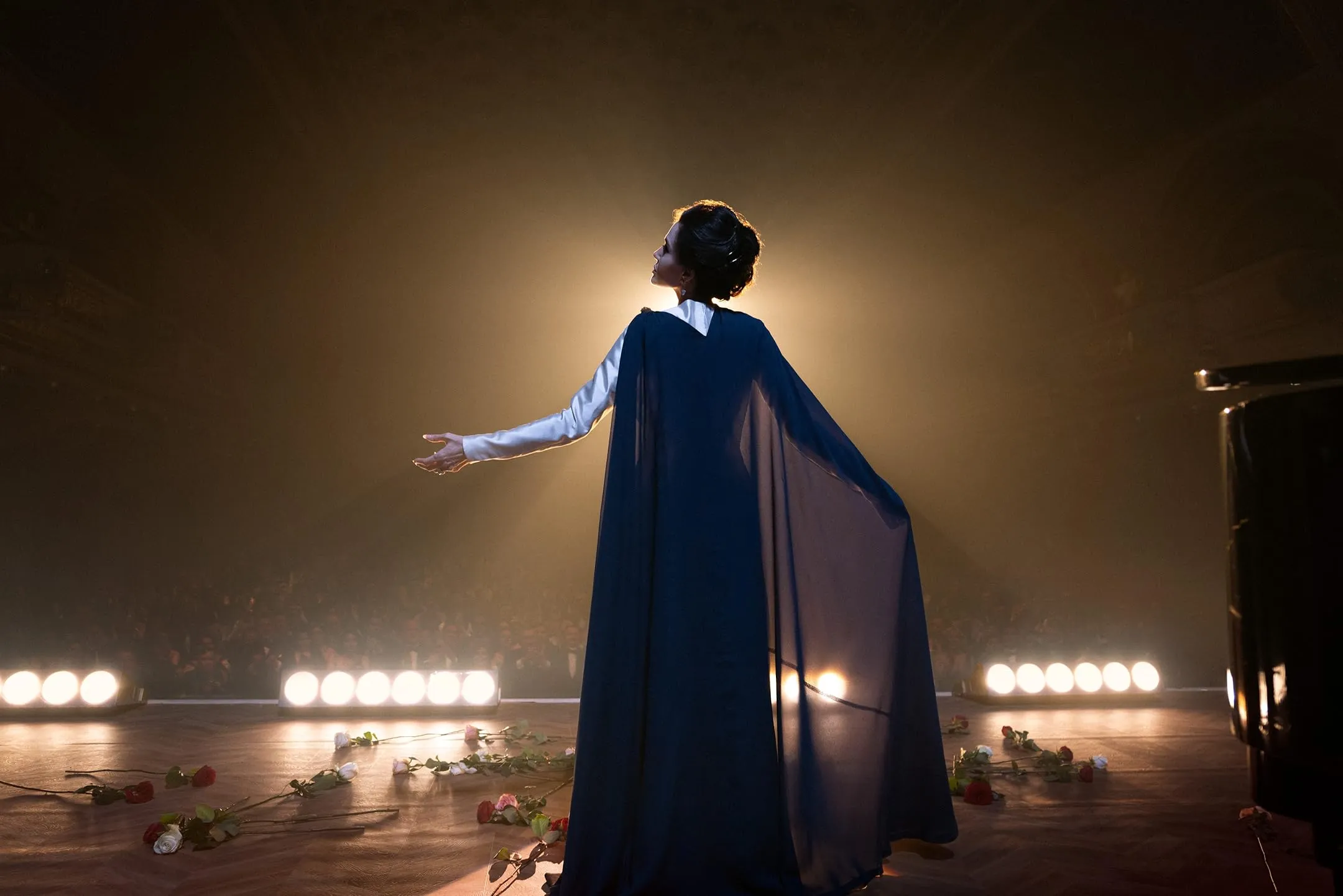Pablo Larraín is a gifted Chilean director known for his intimate portrayals of iconic women. In films like Jackie and Spencer, he peered inside the souls of Jacqueline Kennedy and Princess Diana during moments of turmoil. Now, Larraín turns his lens to the legendary soprano Maria Callas in the biopic Maria.
Callas was born in America but rose to fame in Europe, dazzling audiences with her performances at the world’s great opera houses. Her voice was simply extraordinary—passionate, powerful, and pure. However, her personal life was just as dramatic as any opera. She had a tumultuous affair with shipping tycoon Aristotle Onassis, who left her for Jackie Kennedy. By the late 1970s, after years of vocal strain, Callas had retired from singing at only 49.
In Maria, Larraín homes in on Callas’s final days, just a week before her death. By now, the glory of her career is fading. Her voice, once a gift, has become a burden as she struggles to regain her legendary talent. But underneath the diva’s imperious façade, was Callas a tortured artist longing to reclaim her gift? Or a melancholy legend clinging to the past? Larraín’s film aims to explore this enigmatic woman, though at times it has difficulty penetrating her intricately constructed persona.
Exploring a Diva’s Decline
Maria tells the captivating yet tragic story of legendary soprano Maria Callas during the last week of her life. Set in 1977 Paris, the film flashes back to reveal how troubled Callas had become in her retirement.
For over four years, Callas hadn’t performed publicly. Once possessing a voice like no other, one that could transport audiences through its raw emotion, her gift was now fading. Still only in her early fifties, she was lonely and in poor health. Callas filled her days with pills, neglecting herself while clinging to past glories.
Obsessed with recovering her talent, Callas arranged secret singing lessons. But it became clear—the radiant voice the world once knew was diminished. This shattered the diva’s sense of purpose. Without her music, who was Maria Callas?
Meanwhile, flashbacks gave glimpses into Callas’ turbulent past. We see her drawn into the controlling relationship with shipping tycoon Aristotle Onassis and the pain it left her with. Her driven mother pushed young Maria to sing, shaping the artist but warping the woman.
Through it all, Callas commanded admiration but struggled with intimacy. She hid behind grandeur, masking insecurity. Now in retirement, the fans and fame she craved seemed the only way to affirm her identity. Living in the past had become her prison.
At its heart, Maria ponders what we leave behind after the spotlight fades. How does one retain meaning once defined by a single, celebrated talent? Callas’ sadness comes from realizing her voice alone did not make her whole. Her decline mirrors the toll extraordinary success sometimes takes on the soul.
While more brooding than his earlier films, Larraín’s themes of obsession and confined icons remain. Jolie brings Callas to life through subtle complexity over surface detail. Their shared understanding of navigating fame with compassion brings dignity to Callas’ final tribute.
Capturing a Diva’s World
Pablo Larraín is a masterful director, and his skills are on full display in Maria. He guides the story with elegance, utilizing flashbacks to great effect. These glimpses into Callas’s past feel vivid yet haunting.
Ed Lachman, one of cinema’s finest cinematographers, brings Callas’s world to life. His camera captures 70s Paris in lush autumn hues, evoking the period beautifully. Memory sequences take on a poetic quality too, bathed in black and white’s nostalgic tones.
Lachman films with tremendous subtlety. Simple moments, like light filtering through large windows, become miniature works of visual art. His textures, employing various film stocks, add vibrancy while differentiating reality from recollection.
Production designer Guy Hendrix Dyas outfits Callas’s opulent apartment as a grand stage. It feels regal yet confining, mirroring her isolated life. Massimo Cantini Parrini’s exquisite costumes also play a role. Her former stage finery, now burnt, signals leaving her artistic prime behind.
Music aids Callas’s recollections immensely. Impressive recordings transport us to her glorious performances. Diegetic songs lend surreal magic, like workers suddenly chorusing amid Paris streets. Together, direction and design immerse us in her singular world.
While more could be done to peel back Callas’s intricate persona, Larraín and Lachman succeed in making her environments feel vivid and emotionally impactful. Their skilled craft contributes to understanding what drove this complex, tragic diva.
Bringing Callas to Life
Stepping into the role of an icon like Maria Callas would intimidate any actor. Yet Angelina Jolie rises superbly to the formidable challenge. Her physical transformation alone is astonishing, rendering Callas with eerie accuracy down to the smallest gesture. Beyond looks, Jolie immerses herself in Callas fully.
Months of intense vocal training equipped Jolie to lend her own voice to the role. Her lungs and torso visibly strain under the effort of emulating opera’s power. However, Jolie ensures these scenes remain performances within a performance—we view Callas recreating her art, not watching a mere imitator. The blending of Jolie and Callas’ voices gives a respectful, nuanced portrait of an aging talent.
Jolie’s star power risks overshadowing the fragile diva she depicts. At times, her presence maintains a distance, as if we view a meticulous character study. Yet within this frame, Jolie locates Callas’ humanity. Beyond diva dramas, we see loneliness, obsession, and a soul torn between public and private needs. Her complexity hints at Jolie drawing from mirroring her own navigation of fame.
While distancing occurs, Jolie more often draws us intimately into Callas’ psyche. She ensures our focus lies not with how closely she physically mimics the icon but in understanding Callas’ inner journey in her final days. Through subtle emotional work, Jolie prevents her celebrity from hampering audience connection to the troubled genius at this film’s heart. Hers is a masterful performance that does justice to its subject.
Peeling Back the Persona
For all its portraits of lavish settings and elegant costumes, there remains an intangible distance to Maria Callas in Pablo Larraín’s film. Despite attempts to peel back the soprano’s notorious performativity, her inner spirit stays elusive.
Callas curated an aloof persona so effectively that even devoted fans struggled to see beneath the veneer of “La Diva.” Her obsessive dedication to art and legacy seems driven by private demons never fully illuminated. We catch mere glimpses of what shaped this complex woman—an exploitative mother, a controlling lover—yet lack insight into how these events scarred her.
Jolie brings Callas vividly to life through nuanced gestures and expressions. But something is missing in grasping what fueled Callas’s turmoil in retirement. A vulnerable humanity long denied its public remains elusive, leaving her psyche frustratingly opaque.
Flashbacks provide fleeting clues to Callas’s sorrow rather than clarifying its roots. Family scenes feel hastily sketched, depriving Valeria Golino of fleshing out their meaningful yet painful bond. Glimpses of Callas in her prime stir emotion yet deny sinking into her sorcery onstage.
In prior films, Larraín developed empathy through intimacy with his subjects’ inner lives. Here Callas stays two steps removed even as death looms. We view her through personas projected since youth rather than penetrating her troubled soul.
Callas’s fierce control keeps a vital part of herself from view even in retrospection. As a diva, she inhabited roles yet remains an enigma, even to those striving to understand her humanity. Her story honors a genius yet leaves her mysterious to the end.
Melodies and Memories
Music plays a vital role in Larraín’s vision of Maria Callas’s world. Diegetic songs feel woven into the fabric of her memories. An aria swelling in the streets renders ordinary moments extraordinary, as if Paris itself sings for its prima donna.
These tunes are but one tool in Larraín’s arsenal. Ed Lachman’s camera dances to their rhythm, merging visual and aural. Scenes like workers chorusing beneath the Eiffel Tower or geishas performing in the rain uncover sublime beauty. Music transports us inside Callas’s memories, fleshing out flashbacks that dialogue alone cannot.
Yet arias do more than embellish—they say what words cannot. In a voice blending Callas and Jolie, each note bares complex emotions. Through song, we grasp how music was this diva’s lifeblood—and how its diminishment broke her spirit. Her relation to performers hints at private torment, just as closed doors once opened for an audience.
If dialogue leaves Callas’s psyche murky, her connection to great roles sings clear. Though never giving full performances, these excerpts offer vital insights. In melody we find the soul Larraín’s tale elsewhere struggles to capture, gaining profound entry to this tortured artist’s interior song.
An Elusive Diva’s Swan Song
Pablo Larraín crafts a loving homage to Maria Callas, yet she remains an enigma. Jolie dazzles as the iconic soprano, yet her inner spirit stays indistinct. While paying tribute to Callas’s genius, Maria struggles to truly know the woman beneath the performance.
We see Callas’s extraordinary artistry only through others’ eyes. Flashes of her prime leave longing for more. Yet her haunted psyche evades complete understanding. Larraín’s visionary direction and Jolie’s nuanced performance retain fascination, though Callas herself stays curiously remote.
Where Jackie and Spencer penetrated their subjects’ souls, Maria remains an elegant yet veiled portrait. Its observational remove contrasts Larraín’s usual intimacy. Though a skilled film, it departs from the trilogy’s revelations.
One senses Callas wished to rewrite her final chapter on her own terms. Though this tribute honors her gift, her humanity remains frustratingly obscured. Even in retirement, the diva’s inner life proves an act impossible to fully capture or command. Her enigmatic spirit proves as elusive in homage as it was in life.
The Review
Maria
Maria is a compelling yet imperfect eulogy to an extraordinary yet complex artist. Though brilliantly crafted and anchored by Jolie's astute lead performance, the film struggles at times to penetrate its enigmatic subject's interior life. Ultimately, however, director Larraín and star Jolie succeed in their goal of honoring Callas's talent and resilience against great personal costs, maintaining fascination for her tragic story where definitive answers remain elusive.
PROS
- Lavish and emotionally beautiful direction from Larraín
- Jolie brings Callas to life through nuanced embodiment physically and vocally.
- Gleaning new insights into Callas's drives, insecurities, and tumultuous past
- Evocative glimpses of her artistic brilliance through operatic excerpts
- Understated yet impactful exploration of losing one's defining talent
CONS
- Struggles at times to penetrate Callas's intricate persona on a deep level
- Flashbacks lack specificity to fully illuminate the soprano's psychology.
- Narrative lacks the intimacy of Larraín's prior films in the trilogy.
- Potential for some distance between viewers and the enigmatic leading lady




















































Discussion about this post